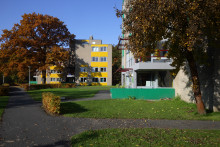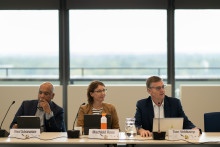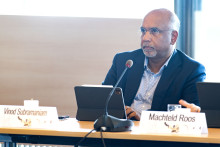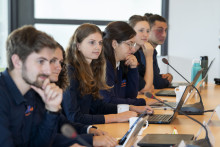During the University Council meeting on Wednesday morning, a discussion was started because of a small sentence in the LTSH (Long-Term Strategic Housing Plan), which states that the Executive Board wants to lower the threshold of co-option. ‘This sentence concerns us,' said Kevin Witlox (UReka). ‘Large campus houses, sometimes with 16 residents, must retain the freedom of choice to pick and choose their housemates. You don't want asthma patients with smokers in one house, or night owls with morning people.’
There are many students who have difficulties finding a place to live in Enschede, Witlox continued his argument. ‘We have to address this problem. But we think that adjusting the co-option will have negative consequences for the wellbeing of students. We therefore ask to look at other alternatives to solve the housing problem.’
The municipality of Enschede and the housing corporations are working hard on extra accommodation for students, said Mirjam Bult, vice-president of the Executive Board. ‘I understand that student houses cherish their housing community. At the same time, we see that some students are being excluded because of their cultural background. And this isn't about allergies. I will put it bluntly: it is about discrimination. Moreover, it is not only international students who are affected by this exclusion: Dutch students also experience problems with co-option. If it is up to the Executive Board, we will get rid of co-optation right away.’
Bult's story provoked quite a few reactions from the University Council. ‘Nobody is in favour of discrimination,’ said Maarten Bonnema (UReka). ‘But in my opinion this is a matter of a shortage of student housing due to the growing number of students. The adjustment of co-option is not going to change this supply problem. We should not interfere with students' freedom to pick and choose their own housemates - that doesn't solve the problem.’
According to Dik Schipper (PvdUT), the UT puts 'the problem' of internationalisation on the students' plate. ‘And it's completely wrong to use words like discrimination.’ Dirk Koelewijn (DAS) fully agreed. ‘Students have not chosen for fast internationalization. The vast majority of students are still in favour of co-option.’
Background
The debate on the right of co-option has been going on for some time now. In 2010, it was already the subject of discussion in the University Council. At that time, the partial abolition of co-option was discontinued. Also, the plan for a 'reverse right of co-option' failed a few years ago.
Alina Ritter (UReka) also contributed. ‘Inclusiveness is very important. However, I think we need to change the mindset of students first. As a German student, I know how difficult it is to find housing in Enschede. But I also know from my own experience that you shouldn't impose it. I ended up in a house where the residents didn't really want me. After a year I left: I didn't want to live with these people at all. If you impose it, the international students will become the scapegoats.’
The Executive Board also received support for the plans to change the right of co-option. According to Lefika Otisitswe (uTOP), students in Enschede are 'used' to co-option. ‘That's where the root of the problem lies. I remember when I first came here and thought: all Africans belong in the ITC hotel and the Dutch students live on campus. It feels a bit like segregation. I think that the Executive Board itself has to find a solution. Otherwise we'll keep going in circles.’
‘The Executive Board does not decide what happens to co-option,’ Bult responded. ‘Ultimately, it's the housing corporations that decide. But the subject is too sensitive to leave it hanging. That's why housing corporations and students have to look for a solution together. Students should make a statement to the housing corporations. Then again, we don't need to come up with a solution today. I would like to hear your suggestions about the process to be followed.’
‘It is indeed a sensitive point.’ Thus chairman Herbert Wormeester summarized the discussion after almost half an hour's talk. ‘Let's come back to it in mid-January.’ Next topic: the concept budget for 2021-2025. ‘I am curious to see whether we will be discussing this item on the agenda, which involves 400 million euros, for the same length of time,’ said Dick Meijer (PvdUT) ironically. That turned out not to be the case. For students, one subject is clearly sacrosanct: the right of co-option.







